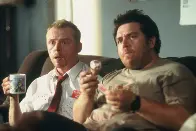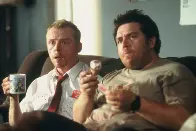How Shaun of the Dead overcame the chaos and redefined horror comedy
How Shaun of the Dead overcame the chaos and redefined horror comedy
Edgar Wright’s rom-zom-com is one of British cinema’s great success stories – but when you know the real story behind it, you can understand how miraculous it was that it ever came out at all, writes Geoffrey Macnab

cross-posted from: https://feddit.uk/post/16246386
This, though, is a very British journey into the macabre. The original title was “Tea Time of the Dead” (a spin on Romero’s Night of the Living Dead, Dawn, and Day of the Dead). It was easy to understand the wariness among industry observers in April 2003 when they heard that the project was finally going into production. The director had sold his film to nonplussed trade journalists as “a naturalistic comedy about the zombified existence of late twentysomethings, crossbred with a full-scale zombie invasion”.
That was a lot to devour. The director later elaborated on the Reel Feedback podcast that Shaun had been conceived in the manner of Mike Leigh’s Life is Sweet (1990). Its heroes Shaun and Ed (Nick Frost) aren’t trying to save the world. They’re ordinary Londoners who, when clear and present danger looms, immediately look for refuge in their favourite pub, the Winchester, where they can have a “nice cold pint and wait for all this to blow over”.
“Mostly in the American films, and even in 28 Days Later, it revolves around the military, or scientists, or people who can do something,” the director said. “What if it’s the least important people? What if it is two guys on the couch who are hungover and missed the news?”
Wright’s admirers were ready to cut him some slack. He already had a fervent following in the UK thanks to cult TV sitcom Spaced, which also starred Pegg alongside Jessica Hynes. Nonetheless, that was no guarantee that he could make a successful movie. His debut feature A Fistful of Fingers (1995), a spoof western made in Somerset when he was barely 20, had received one or two encouraging reviews without making any impact at all at the box office. One critic summed up its ingredients as being “budget £10,000, cardboard horses and a handful of sixth-formers”.
To certain foreign distributors, Shaun of the Dead didn’t seem a commercial proposition at all. It was far too quirky and sardonic. Senior managers at UIP, the company handling its international rollout, refused even to release it in some territories.
...
A few weeks later, though, FilmFour went bust, and the funding for Shaun promptly vanished. There were many reasons why other industry executives were initially reluctant to bite on Shaun of the Dead. As Wright himself acknowledged in You’ve Got Red on You (2021), Clark Collis’s exhaustively researched book about the making of the film, British horror movies “died out” in the 1990s. The glory years of Hammer were a long way in the past.
There had never really been a tradition of British zombie films anyway – and Wright himself was doubtful that the market was big enough for two of them at once. When he and Pegg were working on the first draft of the Shaun of the Dead screenplay, they were utterly dismayed to discover that Trainspotting director Danny Boyle and author Alex Garland were already hard at work on their own London-set story about the undead, 28 Days Later. “I was like, “Argh, no! Oh, we’re f***ed!” Wright admitted to Collis.
Omens on the comedy front weren’t any brighter. In February 2004, only two months before Shaun of the Dead was due to hit cinemas, The Sex Lives of the Potato Men, about the amorous misadventures of a group of vegetable delivery guys, had been fried to a crisp by indignant critics. “Nauseous”, “inept”, “smut for morons”, “witless and repulsive”, “useless”, and “one of the worst films of all time” were some of the nicer remarks reviewers made about the ill-fated film, which, like Shaun, starred several popular TV comedians.

